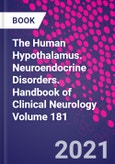Table of Contents
1. Introduction: The human hypothalamus and neuroendocrine disorders
SECTION 15� Structural disorders of the hypothalamo-pituitary region
2. Pituitary stalk interruption syndrome�
3. Empty sella syndrome: Multiple endocrine disorders�
4. Pituitary dysfunction after aneurysmal subarachnoidal hemorrhage
5. Septo-optic dysplasia�
SECTION 16� Tumors of the hypothalamus
6. Hypothalamic hormone-producing tumors�
7. Craniopharyngiomas primarily affecting the hypothalamus�
SECTION 17� Neuroimmunological disorders
8. The stress-axis in multiple sclerosis: Clinical, cellular, and molecular aspects�
9. Neuroendocrine manifestations of Langerhans cell histiocytosis�
10. Neuroendocrine manifestations of Erdheim-Chester disease
11. Hypothalamitis and pituitary atrophy�
12. Narcolepsy Type I as an autoimmune disorder�
13. Neuromyelitis optica, aquaporin-4 antibodies, and neuroendocrine disorders
14. Antibodies against the pituitary and hypothalamus in boxers
15. Autoimmune diabetes insipidus�
SECTION 18� Drinking disorders
16. Neuroimaging of central diabetes insipidus�
17. Differential diagnosis of familial diabetes insipidus
18. The vasopressin-aquaporin-2 pathway syndromes�
19. Adipsic diabetes insipidus�
20. Animal models for diabetes insipidus�
21. Nocturnal enuresis in children: The role of arginine-vasopressin
SECTION 19� Eating disorders
22. Monogenic human obesity syndromes
23. Hypothalamic microinflammation�
24. Glucose and fat sensing in the human hypothalamus�
25. Hypothalamus and neuroendocrine diseases: The use of human-induced pluripotent stem cells for disease modeling�
26. Prader-Willi syndrome: Hormone therapies
27. Transcriptomics of the Prader-Willi syndrome hypothalamus�
28. Disorders of hypothalamic function: Insights from Prader-Willi syndrome and the effects of craniopharyngioma�
29. Animal models for Prader-Willi syndrome�
30. Is there a hypothalamic basis for anorexia nervosa?�
SECTION 20�� Reproduction, olfaction and sexual behavior
31. Sexual differentiation of the human hypothalamus: Relationship to gender identity and sexual orientation
32. Klinefelter syndrome or testicular dysgenesis: Genetics, endocrinology, and neuropsychology
33. Neurobiology of puberty and its disorders
Authors
Dick F. Swaab Netherlands Institute for Brain Research, University of Amsterdam, Amsterdam, The Netherlands.Dick Swaab (1944) earned his medical and doctoral degrees at the University of Amsterdam, where he became involved in brain research during his third year of medical school. He was Director of the Netherlands Institute for Brain Research from 1978 to 2005. Since 1979 he is Professor of Neurobiology at the Medical Faculty, University of Amsterdam.
In 1985, Dr. Swaab founded the Netherlands Brain Bank (NBB) to serve as a source of clinically and neuropathologically well-documented research tissue. Since its founding, the Brain Bank has provided samples from more than 4,000 autopsies to 500 research groups in 25 countries. He was director of the NBB until 2005.
He is Leader Research team Neuropsychiatric Disorders, Neth. Inst for Neuroscience, an institute of the Royal Netherlands Academy of Arts and Sciences (KNAW). Swaab is also appointed for 2011-2017 Chao Kuang Piu Chair of Zhejiang University, Hangzhou, P.R. China.
His major research interests focus on, sexual differentiation of the human brain in relation to gender identity and sexual orientation, aging of the brain, Alzheimer's disease, the neurobiological basis of depression, suicide and eating disorders. He has published over 540 papers in SCI journals, authored more than 200 chapters in books, and edited more than 60 books. Swaab mentored 84 PhD students from which 16 are now full professor. He is "Companion in the Order of the Dutch Lion�, bestowed by her Royal Majesty Queen Beatrix of the Netherlands. In 2008 Swaab obtained the Academy medal for his role in national and international neuroscience.
Dick Swaab is author of the 2 volume monograph The Human Hypothalamus that appeared in the Handbook of Clinical Neurology series, Elsevier, Amsterdam (1000 pp) and the Dutch best seller We are our Brains (450.000 copies sold), that is translated in 14 languages. A children's version of the book (You are your brains) has also appeared in Dutch in 2013 and Russian (2014). Swaab's H-factor is 76.
Ruud M. Buijs Instituto de Investigaciones Biomedicas, Universidad Nacional Autonoma de Mexico, Ciudad Universitaria, Mexico D.F.. Dr. Ruud M. Buijs is head of the Physiology department of the I.I.Biomedicas at the UNAM university and leader of the group Hypothalamic Integration Mechanisms. In that group, the scientists study how the brain and body interact with each other, and hereby the attention is focussed on autonomic and hormonal regulation of body functions under the influence of the biological clock of the brain. Paul J. Lucassen Swammerdam Institute for Life Sciences (SILS) - Center for Neuroscience, University of Amsterdam, Amsterdam, The Netherlands. Paul J. Lucassen did his PhD in 1995 on Alzheimer's Disease at the Netherlands Institute for Brain Research in Amsterdam.After a.o. a postdoc in Leiden, he became Full Professor of Brain Plasticity in 2011 at the Swammerdam Institute for Life Sciences (SILS) of the University of Amsterdam, The Netherlands.
His group studies molecular, nutritional, pharmacological and environmental regulation of brain plasticity. They combine molecular tools, in vitro/vivo model systems, human brain tissue, cohort studies and brain imaging. A major focus is on adult neurogenesis and cognition in relation to; (early life) stress, exercise, enrichment, depression, brain insults and dementia. Ahmad Salehi Stanford Medical School, Department of Psychiatry and Behavioral Sciences, Palo Alto, CA, United States. Ahmad Salehi is affiliated with Stanford Medical School, Department of Psychiatry & Behavioral Sciences, in Palo Alto, CA, United States. Felix Kreier OLVG Hospitals, Amsterdam, The Netherlands. Felix Kreier is a pediatrician and affiliated with OLVG Hospitals in Amsterdam, The Netherlands.








